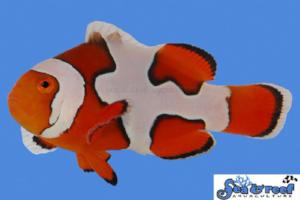Premium Picasso Clownfish, Amphiprion percula
Approx. Size Medium 1 1/2"
Max Size 3"
The Picasso Clownfish is a color variation of the regular Percula Clownfish. The body color and general morphology of Picasso Clownfish is similar to the regular Percula Clownfish, but the stripe pattern is very different. The three white body stripes, and especially the middle stripe, are exaggerated and have various odd shapes. Each one is unique and hand selected at our hatchery. Sea & Reef Aquaculture offer three different grades of Picasso Clownfish namely Picasso Clownfish, Premium Picasso Clownfish and Picasso Clownfish Misbar. Grading of Picasso Clownfish is based on the amount and shape of the white markings. Our
Premium Picasso Clownfish has more white markings than our Picasso clownfish and at least two stripes on each side of the fish are joined. Only a small percentage of Picasso clownfish are selected as the very unique and exquisite Sea & Reef Premium Picasso Clownfish.
Temperament & Captive Care
The temperament and captive care requirements for Picasso Clownfish are very similar to that of the regular Percula Clownfish. It is very peaceful and hardy. They thrive in saltwater aquariums with or without an anemone present.
Feeding
Most clownfish are omnivorous feeders, meaning that they will consume a variety of different food types. In nature the diet of clownfish consists of crustaceans (such as copepods and amphipods), algae, polychaete worms, and leftovers from the anemone’s meal. Our captive bred fish are conditioned to eat a variety of aquarium diets including pellets, flake food, frozen Mysis shrimp, and frozen brine shrimp.
Aquarium Host Anemones
Our Premium Picasso Clownfish will readily accept a wide variety of host anemones and we recommend the popular and hardy Bubble Tip Anemone (Entacmaea quadricolor). As a reference the natural host anemones of the regular ocellaris clownfish are Magnificent Sea Anemone (Heteractis magnifica), Sebae Anemone (Heteractis crispa), and Giant Carpet Anemone (Stichodactyla gigantea).

